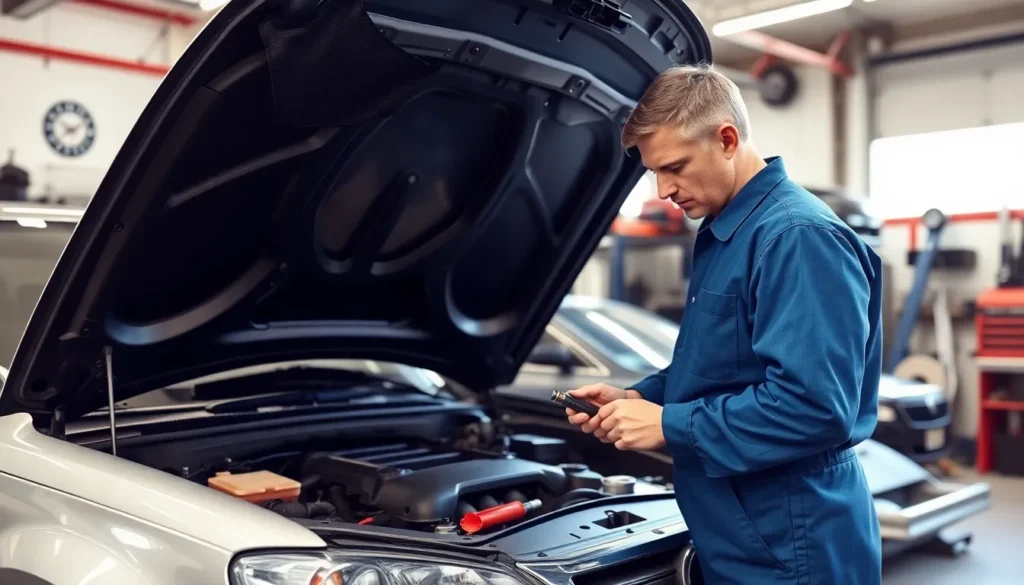When summer hits and the heat cranks up, nothing feels better than a cool breeze from a well-functioning car AC. But what happens when that refreshing gust turns into a hot, stuffy disappointment? If your car’s AC is blowing hot air, it might be time to consider the cost to recharge it.
Table of Contents
ToggleOverview of Car AC Systems
Car air conditioning systems play a crucial role in maintaining comfort during hot weather. These systems work by removing heat and humidity from the vehicle’s interior, creating a cooler environment for passengers. Key components include the compressor, condenser, evaporator, and expansion valve. Each part contributes to the overall functionality of the AC.
Compressors circulate refrigerant through the system, pressurizing it to absorb heat. Condensers release this heat when the refrigerant is transformed back into a liquid state. Evaporators then cool the air entering the cabin, providing relief from the heat. Expansion valves regulate the flow of refrigerant, ensuring the system operates efficiently.
Regular maintenance ensures proper function and can prevent unexpected costs. Insufficient refrigerant levels often lead to decreased efficiency and may cause the AC to blow warm air. Recharging the AC involves adding refrigerant to achieve optimal performance. Mechanics typically check for leaks before performing this service to ensure longevity and effectiveness.
It’s essential to understand that various factors influence the cost of recharging a car AC system. Factors include the type of refrigerant used, local labor rates, and the specific make and model of the vehicle. On average, costs can range from $100 to $300, depending on these factors and any additional repairs needed.
Being aware of how car AC systems function can aid in recognizing when a recharge becomes necessary. Prompt attention to AC issues can prevent extensive repairs and maintain a comfortable driving experience. Understanding the components and their roles in the system enhances one’s ability to identify potential problems early.
Factors Influencing Cost to Recharge Car AC

Understanding the factors that influence the cost to recharge a car AC system helps drivers make informed decisions. Several key elements impact pricing, including the type of refrigerant used and the location of service.
Type of Refrigerant Used
Different refrigerants have varying costs. R-134a and R-1234yf are the most common, with R-134a typically being more affordable. Prices for refrigerant can range from $30 to $60 per pound. R-1234yf, while more environmentally friendly, averages $100 to $150 per pound. The choice of refrigerant not only affects the recharge cost but also impacts system efficiency and overall performance.
Location of Service
Service location significantly affects pricing. Independent auto shops often charge less compared to dealerships, with typical charges ranging from $100 to $150. In contrast, dealerships may charge between $150 and $300. Labor rates differ based on regional economics, so the area where one resides can lead to price disparities. Additionally, urban centers tend to have higher labor costs than rural locations, further influencing total expenses.
Average Cost to Recharge Car AC
Recharging a car’s AC system can vary significantly based on the approach taken. Understanding these costs helps car owners make informed decisions.
DIY Recharge Costs
Purchasing a DIY recharge kit typically costs between $30 and $50. This price includes refrigerant and the necessary tools for the process. Individuals comfortable with basic mechanics can find this option appealing. Instructions usually accompany the kit, helping users complete the recharge effectively. However, successful implementation depends on proper handling of refrigerant and equipment. Complications during the process may necessitate professional assistance, which adds to the overall expense.
Professional Service Costs
Seeking professional services usually incurs higher costs, ranging from $100 to $300. Pricing hinges on factors like local labor rates and the refrigerant used. Generally, shops often charge more for R-1234yf compared to R-134a due to its advanced regulations. Dealerships may also levy higher fees than independent auto mechanics. Choosing a reliable service provider ensures thorough checks and long-term system performance. Investing in professional service can prevent further complications that lead to higher repair costs.
Importance of Regular AC Maintenance
Regular maintenance of a car’s air conditioning system significantly impacts its efficiency and longevity. Ensuring adequate refrigerant levels prevents warm air from blowing through vents. Neglecting maintenance increases the risk of breakdowns, leading to costly repairs.
Scheduled check-ups help identify small issues before they escalate, facilitating proactive solutions. Drivers should routinely examine key components such as compressors, condensers, and evaporators. Keeping these parts in good working condition maintains a comfortable cabin climate.
In addition to comfort, efficient AC systems contribute to overall vehicle performance. Well-maintained systems use less energy, ultimately saving fuel costs. A functioning AC can also improve traction and safety during hot weather conditions.
Frequent service not only enhances comfort but also increases vehicle resale value. Prospective buyers often prefer cars with well-documented maintenance histories. This reassurance can lead to quicker sales and better offers.
It’s worth noting that maintenance schedules can vary based on vehicle models and usage. Typically, checking the system every year aligns with manufacturers’ recommendations. Addressing any concerns promptly can prevent larger issues down the line.
With the cost of recharging an AC system ranging from $100 to $300, regular upkeep can significantly lower the chances of needing a recharge. Understanding this can motivate drivers to prioritize AC maintenance. This commitment ensures a cool, comfortable ride throughout the hot months ahead.
Maintaining a well-functioning car AC system is essential for comfort during hot weather. Understanding the costs associated with recharging the AC can help drivers make informed decisions. Whether opting for a DIY approach or seeking professional assistance, knowing the factors that influence pricing can save money in the long run. Regular maintenance not only enhances system performance but also extends the lifespan of key components. Prioritizing AC upkeep ensures a pleasant driving experience and can prevent costly repairs down the line. By staying proactive with maintenance, drivers can enjoy a cool and comfortable ride all summer long.








